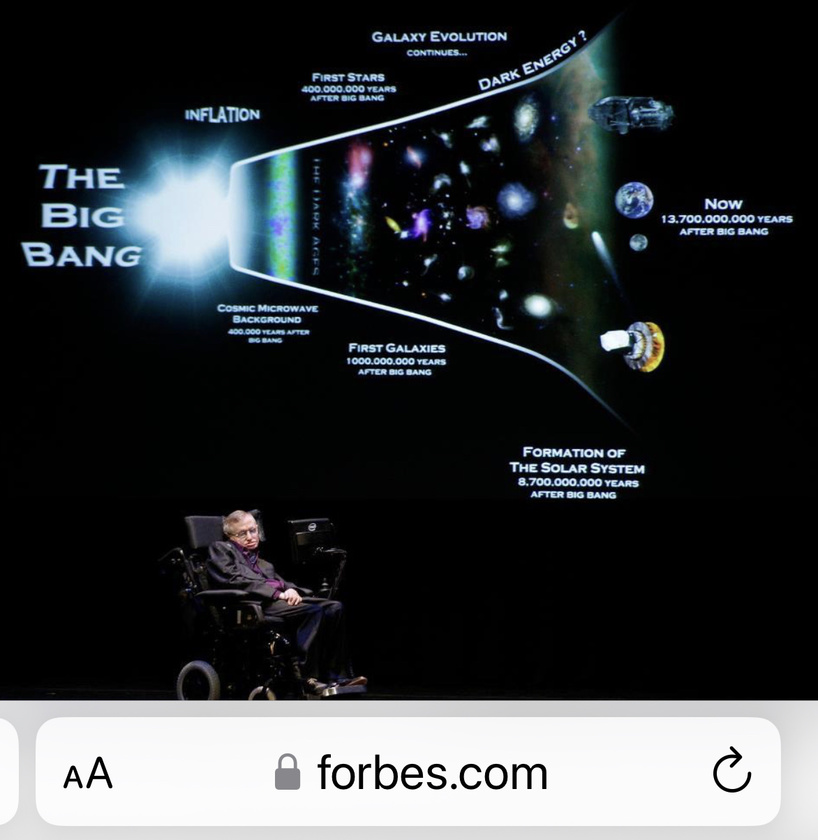
THE POINT OF THIS ARTICLE IS SIMPLE: How much scientific experience, knowledge, education and argumentative debate can mankind dish out in an effort to discredit God as the First Cause of the Universe. The Uncreated Creator-God. Today I will use TWO SIMPLE VERSES from the Book of John, and then show you two articles that work hard in opposition and in support of the Biblical account:
SCIENTISTS CANNOT EXPLAIN THE "FIRST CAUSE" THAT CREATED THE UNIVERSE "EX NIHILO" (OUT OF NOTHING) SO THEY SAY THAT THE UNIVERSE WAS CREATED KIND OF "EX MATERIA" (OUT OF EXISTING MATERIAL) BUT WITHOUT THE MATERIAL. HERE IS WHERE THEY FAIL...THEY FAIL IN THAT THEY CANNOT EXPLAIN WHO CREATED "OUTER SPACE" TO BEGIN WITH. I PROVIDED YOU THE BIBLICAL ACCOUNT OF CREATION, AND BELOW THAT THE SECULAR VIEW ATTEMPTING TO EXPLAIN AWAY GOD AS THE FIRST CAUSE OF THE UNIVERSE. AS YOU READ THEIR ACCOUNT, NOTICE THEIR STRUGGLE TO CLOSE THE GOD LINK REGARDING GOD AS THE FIRST CAUSE OF THE UNIVERSE. THEY TRY THEIR HARDEST, BUT THEIR HIGHLY EDUCATED, SCIENTIFIC MINDS AND TRAINING CANNOT DO IT. SEE BELOW AND REST ASSURED THAT GOD CREATED ALL...THIS IS THE BASIS FOR "THEISM".
John 1:1-2, John 1:14
In the beginning was the Word, and the Word was with God, and the Word was God.He was in the beginning with God. And the Word became flesh and dwelt among us, and we have seen his glory, glory as of the only Son from the Father, full of grace and truth.
==========================
SECULAR ACCOUNT:If you ask anyone about the origin of some phenomenon that we’ve observed, they’ll usually default to the same logical thought process: cause and effect. Whenever you see anything occur, that’s the effect. The processes that occurred earlier and led to the effect occurring are what we typically refer to as the cause: the reason for the effect occurring. Most of us are perfectly willing to extrapolate the phenomena we see back in time in an unbroken chain of cause-and-effect events.
Presumably, this didn’t go back in an infinite chain, but rather there was a “first cause” that led to the very existence of the Universe itself. For a long time, this picture was supported by the notion of the classical Big Bang, which seemed to imply that the Universe began from a singularity: an infinitely hot and dense state from which space and time themselves emerged. But we’ve known for many decades that the Big Bang was the start of many important things — our “Universe as we know it” if you like — but not of space and time themselves. The Big Bang was just another effect, and we think we know what caused it. It reopens the question of whether the Universe had a beginning at all, and the answer so far is that we aren’t sure. Here’s why.
NOW FROM STANDFORD ENCYCLOPEDIA OF PHILOSPHY IN SUPPORT OF GOD AS FIRST CAUSE USING THE "MORAL ARGUMENT" or THE ARGUMENT THAT OUR MORALITY MANDATES GOD AS FIRST CAUSE
Moral Arguments for the Existence of God
First published Thu Jun 12, 2014; substantive revision Tue Oct 4, 2022
Moral arguments for God’s existence form a diverse family of arguments that reason from some feature of morality or the moral life to the existence of God, usually understood as a morally good creator of the universe. Moral arguments are both important and interesting. They are interesting because evaluating their soundness requires attention to practically every important philosophical issue dealt with in metaethics. They are important because of their prominence in popular apologetic arguments for religious belief. Evidence for this can be found in the amazing popularity of C. S. Lewis’s Mere Christianity (1952), which is almost certainly the best-selling book of apologetics in the twentieth century, and which begins with a moral argument for God’s existence. Many ordinary people regard religion as in some way providing a basis or foundation for morality. This fact might seem to favor religious arguments for morality rather than moral arguments for religious belief, but if someone believes that morality is in some way “objective” or “real,” and that this moral reality requires explanation, moral arguments for God’s reality naturally suggest themselves. The apparent connection between morality and religion appears to many people to support the claim that moral truths require a religious foundation, or can best be explained by God’s existence, or some qualities or actions of God.
After some general comments about theistic arguments and a brief history of moral arguments, this essay will discuss several different forms of the moral argument. A major distinction is that between moral arguments that are theoretical in nature and practical or pragmatic arguments. The former are best thought of as arguments that begin with alleged moral facts and argue that God is necessary to explain those facts, or at least that God provides a better explanation of them than secular accounts can offer. The latter typically begin with claims about some good or end that morality requires and argue that this end is not attainable unless God exists. Whether this distinction is hard and fast will be one of the questions to be discussed, as some argue that practical arguments by themselves cannot be the basis of rational belief. To meet such concerns practical arguments may have to include a theoretical dimension as well. (CLICK BELOW FOR THE FULL ARTICLE)












